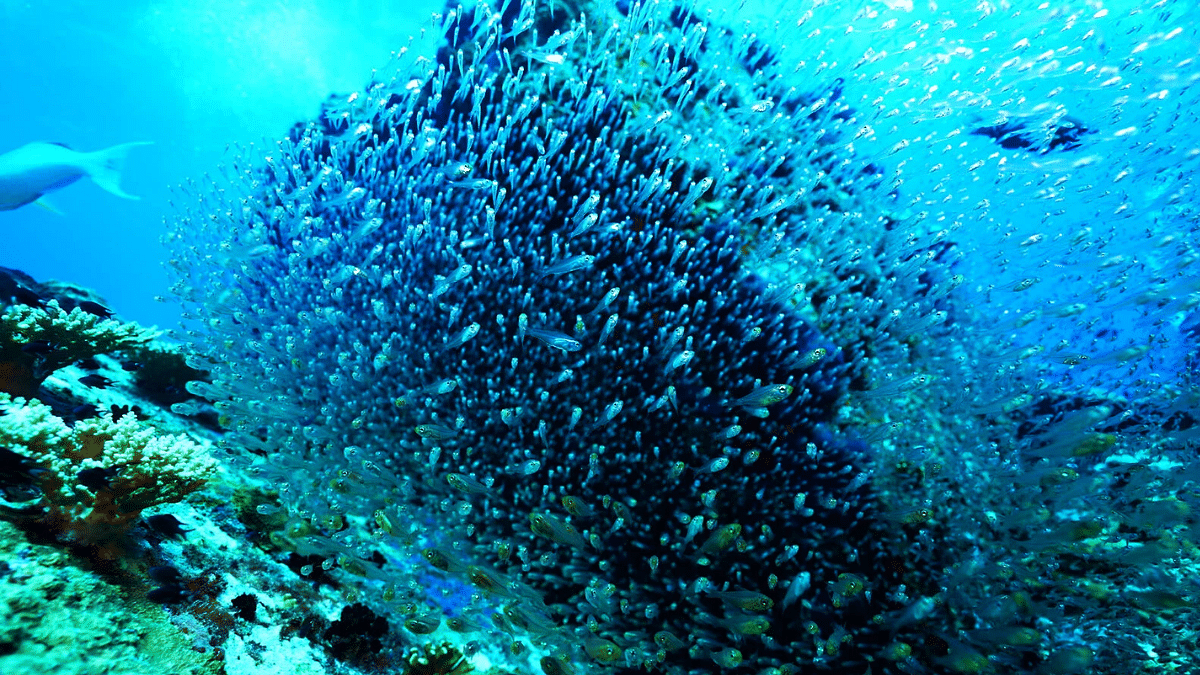Humans are intrinsically connected to the environment, and, on most of the planet, their impact on the Earth is easily seen. But what about the corners of the ocean that are shrouded in darkness and almost impossible to visit? This lack of accessibility creates a disconnect between us and marine ecosystems. Despite having the necessary technology, the ocean mostly remains a mystery â we have more detailed maps of the surface of Mars, Venus and the moon than we do of the deep seafloor of our home planet.
Consequently, compared to terrestrial and even space exploration, the ocean receives little attention and symbolic weight, despite its monumental role in our lives. The ocean provides over 90% of the living space on Earth, helps regulate our weather patterns, sequester carbon and absorb heat from our atmosphere, and feed billions of people around the world. The unique adaptations of deep-sea life to extreme conditions â high pressure, low temperatures, no sunlight â are already contributing to scientific and medical innovations.

Exploring the ocean presents both a daunting challenge and exciting adventure, as groundbreaking discoveries, scientific breakthroughs, and management solutions await. What is missing to unlock this potential and move ocean understanding forward? Coordination, dedicated resources and, most importantly, will.
Expanding our horizons through technology
As radio waves that make wireless communication possible on land do not work in the ocean, livestreaming from the deep sea poses a unique challenge. The solution involves light. The video and audio feeds from the submersible were turned into pulses of light, which were transmitted through the water to a receiver on the Remotely Operated Vehicle (ROV).
Those light signals were then beamed through 6,000 metres of cable to mission control onboard the research vessel, OceanXplorer, up to a satellite above the Earth, and finally back down to Davos.

Transforming our relationship with the ocean
This technology has the potential to transform our relationship with the ocean.
Establishing an environmental baseline, in both shallow and deep ecosystems, is the first step in revealing the complexity of ocean ecosystems and their inhabitants, truly understanding our impact, as well as informing decision-making and management. The tools exist to establish these baselines, but theyâre often not put directly in the hands of those who need them most.
The Seychelles is a global leader in marine conservation and is also at the forefront of climate change, but there is a significant lack of data and knowledge about local marine ecosystems.
Moves are afoot to change this: The livestream took place during an OceanX scientific research mission in the Aldabra Atoll in partnership with the Seychellesâ Department of Environment within the Ministry of Agriculture, Environment, and Climate Change and the local scientific community.
Designed to help develop a comprehensive understanding of the Seychellesâ ocean ecosystems, the mission utilized the comprehensive technology aboard OceanXplorer to facilitate research covering everything from reef and plankton communities to marine megafauna like sharks, dugongs and turtles, and deep-sea habitats.

The technology aboard OceanXplorer is facilitating research into the Seychellesâ ocean ecosystems. Image: OceanX
Understanding deep-sea life presents an opportunity to develop a sustainable and equitable deep-ocean blue economy. Deepening the relationship between humankind and the resources of the deep sea presents a viable solution to issues that face both the environment and the global community.
Through our daily work as a researcher at the Benioff Ocean Science Lab at UC Santa Barbara, and as head of science operations at OceanX â and through high-impact events like our deep-sea livestream into the World Economic Forum â our organizations remain unified in their dedication to bridging the need for deeper, more comprehensive ocean understanding, more effective stewardship and solutions, and to inspiring the world to unite behind these efforts.
This article previously appeared in the World Economic Forum.

